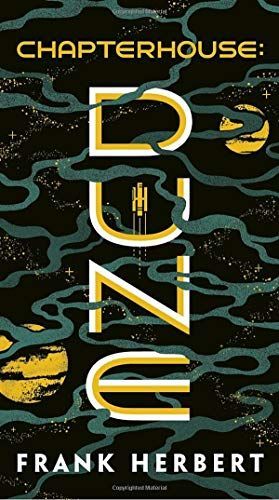
Chapterhouse: Dune
Frank Herbert's Final Novel in the Magnificent Dune Chronicles--the Bestselling Science Fiction Adventure of All Time The desert planet Arrakis, called Dune, has been destroyed. The remnants of the Old Empire have been consumed by the violent matriarchal cult known as the Honored Matres. Only one faction remains a viable threat to their total conquest--the Bene Gesserit, heirs to Dune's power. Under the leadership of Mother Superior Darwi Odrade, the Bene Gesserit have colonized a green world on the planet Chapterhouse and are turning it into a desert, mile by scorched mile. And once they've mastered breeding sandworms, the Sisterhood will control the production of the greatest commodity in the known galaxy--the spice melange. But their true weapon remains a man who has lived countless lifetimes--a man who served under the God Emperor Paul Muad'Dib....
Reviews
Bart Veldhuijsen @bart
Gosse@bestekmes
Chip Snyder@eisbardev
Eugene@jujinjujeen
Brianna@dinosauriaclade
Fraser Simons@frasersimons
Bailee Strong@bailees
Florian@flooops
Paige LeBook@crichtonite
nda and@dookie
Ricardo@myrddinmorfrenwyllt
Maxx Crawford@woodenwarship
Manuel Grabowski@manu_faktur
Oben Akin@oben
Dimi@dprtsk
Mark Aaron Agron@mmmarkagron
Nate Niederkorn@naten
crg bsly@craigbossley
The Rabid Geek@therabidg33k
Sebastian Stoelen@sebastianstoelen
Vladimir@vkosmosa
Lacy Clagg@lacyneedscoffee
Kaylin Twardowski@ktardowski
Saud K@bidyut